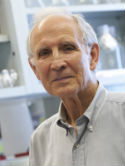| Abstract: |
Purpose: Although tyrosine kinase inhibitors have improved survival in advanced gastrointestinal stromal tumor (GIST), complete response is rare and most patients eventually fail the first-line treatment with imatinib. Sunitinib malate is the only approved second-line therapy for patients with imatinib-resistant or imatinib-intolerant GIST. The clinical benefit of sunitinib is genotype-dependent in regards to both primary and secondary mutations, with GIST patients harboring the KIT(AY502-3ins) exon 9 mutation being the most sensitive. Experimental Design: As sunitinib resistance is now emerging, our goal was to investigate mechanisms of progression and to test the efficacy of novel tyrosine kinase inhibitor on these resistant mutants in vitro. N-ethyl-N-nitrosourea mutagenesis of Ba/F3 cells expressing the KIT(AY502-3ins) mutant was used to investigate novel patterns of resistant mutations evolving in the presence of sunitinib. Results: Tumors from patients who developed sunitinib resistance after at least 1 year of radiographic response were analyzed, showing similar findings of a primary KIT(AY502-3ins) mutation and a secondary mutation in the KIT activation loop. Ba/F3 cells expressing these sunitinib-resistant double mutants showed sensitivity to both dasatinib and nilotinib. Conclusions: Sunitinib resistance in GIST shares similar pathogenetic mechanisms identified in imatinib failure, with acquisition of secondary mutations in the activation domain after an extended initial response to the drug. Moreover, in vitro mutagenesis with or without N-ethyl-N-nitrosourea of Ba/F3 cells expressing KIT(AY502-3ins) showed acquisition of secondary mutations restricted to the second kinase domain of KIT. In contrast, in vitro resistance to imatinib produces a broader spectrum of secondary mutations including mutations in both KIT kinase domains. © 2009 American Association for Cancer Research. |












